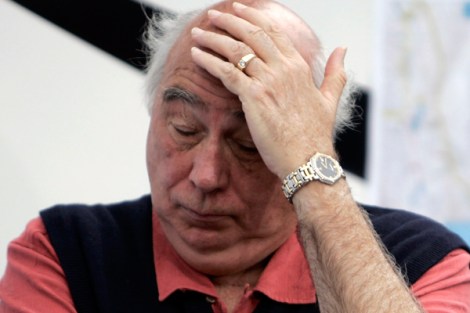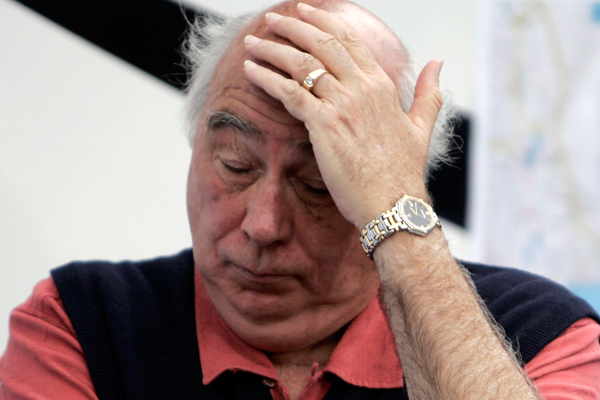
Reuters / Danny MoloshokRobert Murray reflects on a lifetime of deceit ha ha no he’s probably just waiting for the valet.
Robert Murray is head of Ohio coal company Murray Energy. We bring him up in these pages every now and again in part because he is the archetype of a fossil-fuel boss: surly, furious, exploitative. Also in part because he’s forcefully crammed himself into the news this election cycle. Murray, you may remember, is the guy who made his employees attend a Mitt Romney rally, losing a day’s pay in the process.
There is a bright side to Robert Murray, though: His efforts to pick employees’ pockets to benefit Romney are collar-color independent. From a great profile of Murray at The New Republic:
In May, [Murray] hosted a $1.7 million fund-raiser for Romney. Employees have given the nominee more than $120,000. …
The accounts of two sources who have worked in managerial positions at the firm, and a review of letters and memos to Murray employees, suggest that coercion may also explain Murray staffers’ financial support for Romney. Murray, it turns out, has for years pressured salaried employees to give to the Murray Energy political action committee (PAC) and to Republican candidates chosen by the company. Internal documents show that company officials track who is and is not giving. The sources say that those who do not give are at risk of being demoted or missing out on bonuses, claims Murray denies.
The magazine explains how the system works.
The pressure to give begins as soon as employees enter the company, the Murray sources say. At the time of hiring, supervisors tell employees that they are expected to contribute to the company PAC by automatic payroll deduction–typically 1 percent of their salary, a level confirmed by a 2008 letter to employees from the PAC’s treasurer. (That letter also assures employees that they would not be “disadvantaged” by not giving.) Employees are given a form to sign, explaining that the giving is voluntary. “In the interview … I was told that I would be expected to make political contributions — that [Murray] just expected that,” says the first source. “But I was told not to worry about it, because my bonuses would more than make up what I would be asked to contribute.”
Murray is known to be punitive. He recently filed a lawsuit against a reporter who criticized him. It’s no wonder, then, that employees are skittish about revealing his donation practices.
The Murray sources, who requested anonymity for fear of retribution, came forward separately. But they painted similar pictures of the fund-raising operation. “There’s a lot of coercion,” says one of them. “I just wanted to work, but you feel this constant pressure that, if you don’t contribute, your job’s at stake. You’re compelled to do this whether you want to or not.” Says the second: “They will give you a call if you’re not giving. … It’s expected you give Mr. Murray what he asks for.”
At the now-infamous rally, Romney told the unpaid miners, “You’ve got a great boss, he runs a great operation here.” No doubt Romney thinks so, for a variety of reasons.



